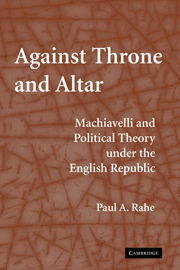Book contents
- Frontmatter
- Contents
- Acknowledgments
- Abbreviations and Brief Titles
- Introduction
- Prologue: Machiavelli in the English Revolution
- PART I MACHIAVELLI'S NEW REPUBLICANISM
- 1 Machiavelli's Populist Turn
- 2 The Ravages of an Ambitious Idleness
- PART II REVOLUTIONARY ARISTOTELIANISM
- PART III MACHIAVELLIAN REPUBLICANISM ANGLICIZED
- PART IV THOMAS HOBBES AND THE NEW REPUBLICANISM
- Epilogue
- Index
2 - The Ravages of an Ambitious Idleness
Published online by Cambridge University Press: 21 July 2009
- Frontmatter
- Contents
- Acknowledgments
- Abbreviations and Brief Titles
- Introduction
- Prologue: Machiavelli in the English Revolution
- PART I MACHIAVELLI'S NEW REPUBLICANISM
- 1 Machiavelli's Populist Turn
- 2 The Ravages of an Ambitious Idleness
- PART II REVOLUTIONARY ARISTOTELIANISM
- PART III MACHIAVELLIAN REPUBLICANISM ANGLICIZED
- PART IV THOMAS HOBBES AND THE NEW REPUBLICANISM
- Epilogue
- Index
Summary
There is more to Machiavelli's argument than a mere description of what he termed “the effectual truth of the matter.” Behind the description lies an elaborate program. In the well-polished preface to the first book of his Discourses on Livy, as we have seen, the Florentine presents himself as an intrepid explorer of a political continent hitherto unknown, contending that it is “no less perilous to discover new modes and orders (modi ed ordini nuovi) than to search unknown waters and lands,” and claiming that the “new modes and orders” which he has discovered constitute “a path as yet untrodden by anyone.” It is this path that he is inviting his readers to follow.
The phrase that Machiavelli deploys, modi ed ordini nuovi, is pregnant with meaning. When he speaks of orders, Machiavelli means magistracies and other institutions; in mentioning modes, he refers to the practices governing the operation of these magistracies and institutions. But there is far more to the significance of the Florentine's choice of words than this, for he has borrowed the pertinent expression from Thomas Aquinas, who used modus ed ordo in his commentary on Aristotle's Politics where that work's author had alluded to “the distribution and disposition of offices and honors (táxis tōn archōn)” that constituted a polity's ruling order (políteuma) and thereby defined its political regime (politeía).
- Type
- Chapter
- Information
- Against Throne and AltarMachiavelli and Political Theory Under the English Republic, pp. 56 - 100Publisher: Cambridge University PressPrint publication year: 2008



